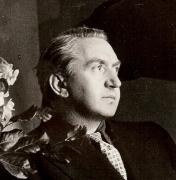|
|
||||||||||||||||||||||||
 |
Featured person
Recently added |
Philip Solomon (1924 - 2011): |
||||||||||||||||||||||
Philip Solomon was one of the most significant figures on the business and promotional side of (mainly) the popular music scene in Ulster and later England, who discovered or managed some of the most prominent names, including some who would become internationally acclaimed. He was also prominent in the offshore/pirate radio world, especially the now-legendary Radio Caroline.
Philip Raymond (often "Phil”) Solomon was born into a Belfast Jewish family, of which the firm run by his father, Solomon and Peres, was a well-established music and entertainment retailer, distributor and production house. For years “The Gramophone Shop” was a leading record shop in Belfast city centre. Both he and his elder brother Mervyn entered the family business, though Philip had originally intended to become a vet. An early client, in the 1950s, was the famous Belfast singer, Ruby Murray, who became one of the most successful popular music singers throughout the United Kingdom during the 1950s (she was the first artist from Ulster to reach Number One in the charts). Solomon and his wife, Dorothy, who was every bit his professional equal, also acted as tour promoters for other leading popular performers (Acker Bilk, Jim Reeves, Jimmy Shand amongst others) as well as various bands and other groups.
In 1961 the Solomons moved to London, where some of their first clients were Cliff Richard, Kenneth McKellar, and none other than Louis Armstrong, the famous jazz musician. 1962 they took on a young Dublin group, The Bachelors, as a backing group for two Danish singers, and they became famous internationally. They also helped Solomon financially when in the mid-1960s he acquired a significant interest in the famous Radio Caroline. The station broadcast from two ships, MV Caroline North and MV Caroline South. and was what was known to some as a “pirate” radio station, as it operated outside British territorial waters and hence could not be required to apply for a licence under British domestic law; the contrary view was they were independent stations doing nothing illegal (as was the case but see below). Also, the Solomon brothers had their own record companies (Emerald for Mervyn, Major Minor for Philip) and some music fans resented Solomon’s ability to control what Radio Caroline broadcast, considering much of the output “dire”, according to one. Other fans admired his talent-spotting. However, the British government was determined effectively to put Radio Caroline under control, or even out of business, and passed legislation, the Marine Offences Act, 1967, in order to achieve this. The legislation effectively made British nationals subject to British law whether or not they were operating radio stations from outside British territory, so that they could be made to seek a licence – the very requirement they had been avoiding as they regarded powerful record companies and the BBC as effectively operating a monopoly. Philip Solomon claimed Irish citizenship so that the new legislation did not apply to him and he continued to operate Caroline from London; his determination to use his business abilities initially brought financial survival, for which some were grateful but his perceived flooding the output with his own productions did cause resentment. Financial problems meant the impounding of the ships and the end, for the time, of the station. Major Minor ended in the mid-1970s.
The Solomons (in many respects it is difficult to separate the three of them) were undoubtedly responsible for bringing before the public some highly regarded musicians. Mervyn discovered a band called Them, one of whose members was an East Belfast man, Ivan Morrison, who later became world famous as Van Morrison; among Philip’s more controversial discoveries, in 1969, was in France. An English actress and chanteuse settled in France, Jane Birkin, had recorded a song with French actor Serge Gainsbourg. The song, “Je t’aime...moi non plus”, was released on a label called Fontana, but it was regarded in several European countries as too lascivious, and Fontana withdrew it. Philip took it on for Major Minor, but had it in the shops before Fontana withdrew it from stock, so that exactly the same recording made UK chart history by occupying two chart positions at the same time (Philip’s was number 3, Fontana’s number 16).
Philip had other interests: for example, he dabbled in horse breeding, and the Solomons had art galleries in Dublin and London; Mervyn was an art dealer until he was fatally injured in a car accident. Visitors to his home were sometimes taken aback by the complete lack of wall space in his entrance hall which was covered with paintings. Mervyn had been a particularly keen admirer of the work of Jack B Yeats.
Philip and Dorothy retired to Bournemouth where he died. The former chief disc jockey at Caroline, Robbie Dale Robinson, said of Philip:
“Phil was a true and tenacious business cookie, one of my never to be forgotten friends in life. A remarkable stand alone record industry man. Sometimes feared but admired by many. A lot of folks in radio never knew or understood the extent and depth of genuine support Philip R Solomon gave to Radio Caroline at a time when many so called big shots turned their backs and walked away. He and I fell in and out a lot in those turbulent times but I always admired and respected his judgment. I was one of those glad to receive his help and witness his generosity during his outstanding career in the entertainment business and radio game.”
| Born: | 27 April 1924 |
| Died: | 10 April 2011 |
| Richard Froggatt |
| Bibliography: www.radiocaroline.co.uk; www.janebirkin.net; Irish Independent, 8.5.2011; The Independent, 21.6.2011; www.offshoreradio.co.uk/psolomon; private information; personal knowledge |


Home | Our Policies | Plaques | Browse | Search | Sponsors | Links | Help | Contact
Privacy & Disclaimer | Cookie Policy | Site Map | Website Design By K-Point
© 2024 Ulster History Circle









